|
|
|
Sort Order |
|
|
|
Items / Page
|
|
|
|
|
|
|
| Srl | Item |
| 1 |
ID:
106361
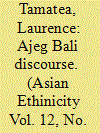

|
|
|
|
|
| Publication |
2011.
|
| Summary/Abstract |
This article explores the Ajeg Bali movement in Bali, Indonesia, as manifest online. It is argued that in addition to Ajeg Bali comprising local politics of decentralisation, it is a manifestation of the globally mobile culture of fear. Analysis of online Ajeg Bali discourse shows the deployment of discourses of fear as a response to intensified hybridising incursions into the Balinese nation-space, resulting from the increased mobility of ideas, images, capital, people and technology.
|
|
|
|
|
|
|
|
|
|
|
|
|
|
|
|
| 2 |
ID:
144945
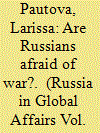

|
|
|
|
|
| Summary/Abstract |
Social phenomena do not usually occur suddenly but ripen gradually. Often social manifestations hide behind seemingly insignificant fashionable trends. The fear of war in recent years is revealed in worried, although almost invisible, attitudes expressed during opinion polls. Concurrently, a military style trend has slowly but steadily entered everyday life: paintball and shooting sports are incredibly popular; teenage girls wear combat boots, camouflage clothing, and dog tags. Indeed, T-shirts with images of "Polite People" and the Iskander and Topol missile systems are in high demand. If we put these fashion trends into the context of the nationwide celebrations of the 70th anniversary of the victory in World War II, the military theme is hard to miss.
|
|
|
|
|
|
|
|
|
|
|
|
|
|
|
|
| 3 |
ID:
120701
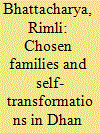

|
|
|
|
|
| Publication |
2013.
|
| Summary/Abstract |
In the Indian subcontinent, the understanding of 'the family' in numerous narrative traditions has always extended into relationships with non-humans, with a pivotal emphasis on the guru-shishya (preceptor-disciple) relationship. This paper focuses on the highly popular English-language 'juvenile fiction' of Dhan Gopal Mukerji to suggest how he reconfigured these narrative traditions for a primarily non-Indian audience in the 1920s-30s. The paper considers Mukerji's young protagonists-invariably male, whether human or animal-in relation to the web of familial and outside social relationships through which the 'quest motif' is played out for a transnational readership. The epic form pervades his 'jungle books' through the figures of the animal protagonists, the search for a leader/guide/guru, and a re-imagining of caste, ethnicity and gender. Of particular interest is the composite mother figure. Dhan Gopal's oeuvre for children maps out a socialisation that is 'free' of the apparatus of the colonial home or of other disciplining institutional sites. Paradoxically, the search to be 'free from fear' can only be played in the alternative topos of the jungle, where violence is inescapable. How, if at all, may these narrative tropes be mapped onto contemporary history?
|
|
|
|
|
|
|
|
|
|
|
|
|
|
|
|
| 4 |
ID:
093863


|
|
|
|
|
| Publication |
2010.
|
| Summary/Abstract |
Both crime and terrorism impose costs onto society through the channels of fear and worry. Identifying and targeting groups that are especially affected by worries might be one way to reduce the total costs of these two types of insecurity. However, compared with the drivers of the fear of crime, the determinants of concerns regarding global terrorism are less well known. Using nationally representative survey data, we analyse and compare the individual determinants of concern about global terrorism and crime. We show that worries about terrorism are driven by similar determinants as those about crime, which could have important policy implications. We, furthermore, provide an insight into the structure of the determinants of concerns regarding other public and private goods.
|
|
|
|
|
|
|
|
|
|
|
|
|
|
|
|
| 5 |
ID:
166678


|
|
|
|
|
| Summary/Abstract |
Fear is an integral part of terrorism. Fighting fear can thus be a crucial part of counterterrorist policies. In the case of terrorism, citizens look to the state for protection. Yet, most studies of terrorist fear emphasize individual-level factors. We lack studies that link fear to features of the state, especially whether democratic states are capable of reducing fear among its citizens. Our study aims to fill part of this research gap by asking whether democratic government reduces or increases fear of terrorism. We find that there is substantial cross-country variance in citizens’ fear of terrorism. The results suggest that fear is more widespread among citizens in non-democratic countries compared to citizens in democratic countries. Actual exposure to terrorist attacks has no impact on citizens’ fear of terrorism when we account for whether the country is a democracy or not. Hence, democratic government displays resilience towards fear mongering.
|
|
|
|
|
|
|
|
|
|
|
|
|
|
|
|
| 6 |
ID:
165448
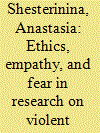

|
|
|
|
|
| Summary/Abstract |
The discussion of ethics in the social sciences focuses on ‘doing no harm’ and ‘giving back’ to research participants, but does not explore the challenges of empathy and fear in research with participants in political violence and war. Drawing on 180 in-depth interviews on the Georgian–Abkhaz war of 1992–93 collected over eight months between 2010 and 2013 primarily in Abkhazia, but also Georgia and Russia, I argue that researchers can come to empathize with some but fear other participants in past and present violence. These emotional responses can influence researchers’ ability to probe and interpret interviews and respondents’ ability to surpass strong positions to explore dilemmas of participation in violence. By empathizing with not only ‘victims’ and ‘non-fighters’ as I had expected based on my pre-existing moral-conceptual categories, but also participants in the war, I found that individuals adopted multiple overlapping roles and shifted between these roles in the changing conditions of violence. In contrast, failing to empathize with and fearing those who continued to participate in violence after the war of 1992–93 limited my ability to fully appreciate the complexity of their participation, but shed light on the context of violence in contemporary Abkhazia. This analysis shows that reflection on the role of empathy and fear in shaping our interactions with research participants can help advance our understanding of participation in violence and this difficult research context.
|
|
|
|
|
|
|
|
|
|
|
|
|
|
|
|
| 7 |
ID:
186341
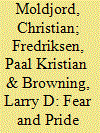

|
|
|
|
|
| Summary/Abstract |
This article analyzes the combat emotions of Royal Norwegian Air Force Fighter pilots (hereafter RNoAF) during their bombing campaign over Libya in 2011. Using grounded theory in our interviews with them, we identified 12 categories of their emotions and behaviors, with variations in pride and fear emerging as the two key themes. We show how those two emotions thread through the literature of emotions in combat, and show further how our data, and the resulting matrix from an analysis of it, both apply to and extend that literature. We also show how the high and low variations of pride and fear interact to both support and counter each other. Our findings thus make an important contribution to the combat emotions literature on the action and behavior of fighter pilots.
|
|
|
|
|
|
|
|
|
|
|
|
|
|
|
|
| 8 |
ID:
160475
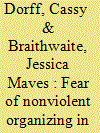

|
|
|
|
|
| Summary/Abstract |
What drives perceptions of fear regarding nonviolent mobilization? We investigate whether this fear is more acute in certain segments of society, or whether such concerns are randomly distributed across the population. We anticipate that civilians living in proximity to armed resistance groups are especially afraid of being targeted if they organize nonviolently against insecurity in their community. Using original survey data from Mexico in early 2014, we examine civilian perceptions of risk associated with nonviolent action. Quantitative analyses provide support for our expectation that civilians living in proximity to armed vigilante groups are more fearful of participating in nonviolent action. This suggests that organizers of civil resistance in Mexico (and similar conflict environments) would do well to consider the challenges posed by civilian vigilantism when seeking to mobilize civilians and selecting specific nonviolent strategies for high-risk constituencies.
|
|
|
|
|
|
|
|
|
|
|
|
|
|
|
|
| 9 |
ID:
094848
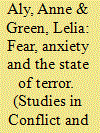

|
|
|
|
|
| Publication |
2010.
|
| Summary/Abstract |
The 11 September 2001 terrorist attacks on the World Trade Center and the Pentagon marked the advent of an unprecedented preoccupation with terrorism. Although Australia's actual terrorist risk profile remains marginal in comparison with other mortality risks, in times of crisis, the reasoned negotiation of risk is marginalised. Drawing on the findings of qualitative research, this article offers an analysis of how Australians are responding to the threat of terrorism embodied in a developing discourse of the war on terror and how they construct their perceptions of terrorist risk. The findings implicate community fear as a factor that should be considered in the development of counter terrorism strategies that emphasize community engagement as a mechanism for challenging radicalisation in democratic states.
|
|
|
|
|
|
|
|
|
|
|
|
|
|
|
|
| 10 |
ID:
155273
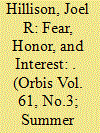

|
|
|
|
|
| Summary/Abstract |
The “America First” approach to foreign policy represents an opportunity to reassess relations with Russia. Efforts to deter Russian aggression have failed. Perhaps a new approach is needed. This article uses the lessons of the Peloponnesian War to help guide the West’s approach to Russia. By examining the three motivations for warfare—fear, honor and interest—it is possible to craft a more effective deterrent strategy while avoiding a security dilemma. Current approaches have discounted legitimate Russian fears of NATO and EU encroachment. They also have neglected the role of honor in Russia’s actions and how this impulse frames Moscow’s views of the West. Finally, NATO and the EU have lost sight of Russia’s vital interests in pursuing further eastward expansion. Where the West cannot compromise is on the security of NATO and EU members and the unity of the Trans-Atlantic alliance.
|
|
|
|
|
|
|
|
|
|
|
|
|
|
|
|
| 11 |
ID:
175294
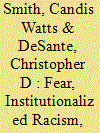

|
|
|
|
|
| Summary/Abstract |
For nearly 75 years, scholars of American public opinion have sought to measure whites’ attitudes toward blacks: social scientists have invented and revised ways to measure what we could refer to as “racial prejudice.” With each revision, scholars who believe they have captured new forms of racial animus are met with opposition from those who believe that old-fashioned anti-black affect is a thing of the past. We directly answer these claims by collecting a surfeit of attitudinal measures to simultaneously estimate the relationship between cognitive beliefs about the racial status quo and emotional reactions to racism. First, we uncover that two higher-order dimensions undergird whites’ racial attitudes. Second, we validate a four-item version of our new battery using the 2016 Cooperative Congressional Election Study.
|
|
|
|
|
|
|
|
|
|
|
|
|
|
|
|
| 12 |
ID:
156999


|
|
|
|
|
| Summary/Abstract |
A volatile US president has stirred up new angst over the nuclear peril. The UN treaty banning the bomb may not have much immediate effect, but it could be a first step toward a safer future.
|
|
|
|
|
|
|
|
|
|
|
|
|
|
|
|
| 13 |
ID:
190934
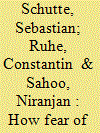

|
|
|
|
|
| Summary/Abstract |
Earlier research on ethnic and religious conflict has identified fear as an important motivation. While theoretically sound, this expectation has never been tested at larger scales in ongoing episodes of political violence. Instead, conceptual progress has been made in lab experiments. Combining insights from observational research and stylized experiments, we predict that fear for personal safety due to witnessed violence causes prejudice against out-groups, enhanced internal cohesion, and support for extremist actors. To test these predictions, we conducted surveys in the Indian State of Uttar Pradesh with identical respondents in three waves starting in January 2017. The surveys continued during the tense Legislative Assembly elections in the Spring. The results largely corroborate the theoretical expectations and present a hard in-vivo test of long-standing conjectures.
|
|
|
|
|
|
|
|
|
|
|
|
|
|
|
|
| 14 |
ID:
146789


|
|
|
|
|
| Summary/Abstract |
After the 1948 war, the cease-fire lines between Israel and its neighbours remained porous. Palestinian refugees crossed the borders. Some returned to cultivate their fields; others crossed the border as thieves. Some intended to murder Israelis and wreak terror. Most of the refugees who made their way into Israel were not violent, but their presence frightened Jewish civilians living in frontier regions. Policy-makers and cultural agents of the social elite mobilized to mould the threatened population into Israelis who could display fortitude. The article analyzes the emotional regime the Israeli state sought to inculcate and the desirable and undesirable outcomes of this policy.
|
|
|
|
|
|
|
|
|
|
|
|
|
|
|
|
| 15 |
ID:
160613
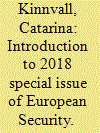

|
|
|
|
|
| Summary/Abstract |
The European Union (EU) faces many crises and risks to its security and existence. While few of them threaten the lives of EU citizens, they all create a sense of anxiety and insecurity about the future for many ordinary Europeans. Amongst these crises are the more obvious challenges of sovereign debt and fiscal austerity; refugees from conflicts in Afghanistan, Iraq, and Syria; and the rise of populist far-right parties across Europe. But behind these challenges lie less visible insecurities about economic prospects, social wellbeing, and a widespread expectation that the EU is unable to answer the challenges of twenty-first century global politics. In other words, the greatest security challenge facing people across Europe is not physical, despite the threats of Putin and ISIS, but is a sense of fear and anxiety over their daily lives.
|
|
|
|
|
|
|
|
|
|
|
|
|
|
|
|
| 16 |
ID:
186807


|
|
|
|
|
| Summary/Abstract |
Although only 23 people on average have been killed per year by terrorist attacks in the United States since 2001, American citizens and politicians consistently rank terrorism as a top security threat, leading to costly wars abroad and the repression of civil liberties at home. To what extent can education about terrorism alter perceptions of the threat? Much existing scholarship—and consistent polling over the past two decades—suggests that it cannot, but we disagree. Evidence gathered from an extensive series of experimental and observational surveys involving students in 31 terrorism and non-terrorism related courses at 12 universities—including massive open online courses (MOOC) and online surveys—reveals that the more individuals learn about terrorism, the smaller they perceive the threat to be to themselves and to the U.S. In the fight against terrorism and the fear it inspires, knowing really is half the battle.
|
|
|
|
|
|
|
|
|
|
|
|
|
|
|
|
| 17 |
ID:
174367
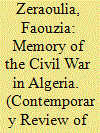

|
|
|
|
|
| Summary/Abstract |
The Algerian Civil War during the 1990s is considered to be one of the violent wars in the Arab world. For one decade, isolated from the international community, the country and its civilians suffered from extremism, radicalism, torture, and assassinations. Today, it is arguable that the memory of the Algerian Civil War played a pivotal role in producing the legitimacy of the political system and framing the citizens’ perceptions of the postwar regime before the current manifestations. Nevertheless, no field research has explored how that memory is represented and recalled by the people. Through analyzing the public narrative, surveying and examining the public platforms, and conversations dealing with the past civil war in Algeria, this article seeks to demonstrate how that violent past is remembered in the public arena, the emotions that have been accumulated from such experience and the lessons that have been learned by the people. In doing so, we use many examples from the Algerian manifestations after 22 February 2019, or what is called “the Algerian Hirak.”
|
|
|
|
|
|
|
|
|
|
|
|
|
|
|
|
| 18 |
ID:
165738
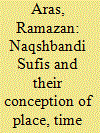

|
|
|
|
|
| Summary/Abstract |
The employment of diverse forms of security and control on territorial borders have led to the production of numerous events of border crossings, smuggling, banditry and death along with stories of separation, loss, mourning, pain, and yearning in the everyday life of border people. The Naqshbandi Khaznavi order has an expansive interpersonal social network across the political borders of Turkish and Syrian nation-states. This work analyzes the ways in which Sufis dealt with diverse aspects of the Turkish-Syrian border by unbinding shackles and orders of political system that were fabricated constantly from the 1920s to the early 1980s. The life stories and narratives of the Sufis document the existence of a religious-cultural landscape, diversifying the perception of place, time and fear which have transcended political borders for decades, contradicting official cartographic imagination and the modern-secular understanding of place and time. Besides, in addition to analyses of religious orders as social, economic and political entities, this work aims to elucidate emotional aspects of relations and faith that coexist between Sufis and their Sheikh in the context of spatial distance, political border and fear of death.
|
|
|
|
|
|
|
|
|
|
|
|
|
|
|
|
| 19 |
ID:
092297


|
|
|
|
|
| Publication |
2009.
|
| Summary/Abstract |
Moving beyond the political framework of both Hobbes and Schmitt that privileges a centralization of power as a way of dealing with the fear of violent death, this article turns to Foucault's discourses of war, power over life, and governmentality to illuminate the contemporary reproductive potential of fear in exercises of preservation of life in society. The decentralization of fear and power in governmentalized modernity encourages various public agents/agencies to mobilize the specter of danger, threat, insecurity, or enmity to normalize populations. This article reflects on the effects of this (re)productive mobilization of fear and emphasizes the proliferation of dispositifs of terror that engender a fear of not being able to live one's normal life.
|
|
|
|
|
|
|
|
|
|
|
|
|
|
|
|
| 20 |
ID:
153507
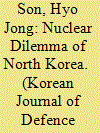

|
|
|
|
|
| Summary/Abstract |
Why does North Korea continue to insist on maintaining a nuclear program despite
its potential to be detrimental to the regime in the long term? This article argues
that North Korea’s nuclear development strategy is derived from policymakers’
cognitive systems and norms that have accumulated over the decades. This study
especially attempts to examine the mechanism behind how the normative system
shaped by North Korea’s historical environment generates and re-generates nuclear
strategy through nuclear discourse by applying the lens of Strategic Culture. It
begins with a critical assessment of previous research on the motives of a nation
or regime’s nuclear development policy and proposes the suitability of Strategic
Culture for North Korea’s case. This article then characterizes North Korea’s
Strategic Culture as a “Wartime Preferring Strategic Culture” which emphasizes
the norm of the “prioritization of military values,” “closed groupism,” and “deontic
mass mobilization.” These norms are based on the policymakers’ cognitive systems
related to the fear of regime cleavage. Consequently, North Korea’s Strategic
Culture, which is based on fear perception, influenced policy makers and drove
them to strengthen nuclear development.
|
|
|
|
|
|
|
|
|
|
|
|
|
|
|
|
|
|
|
|
|